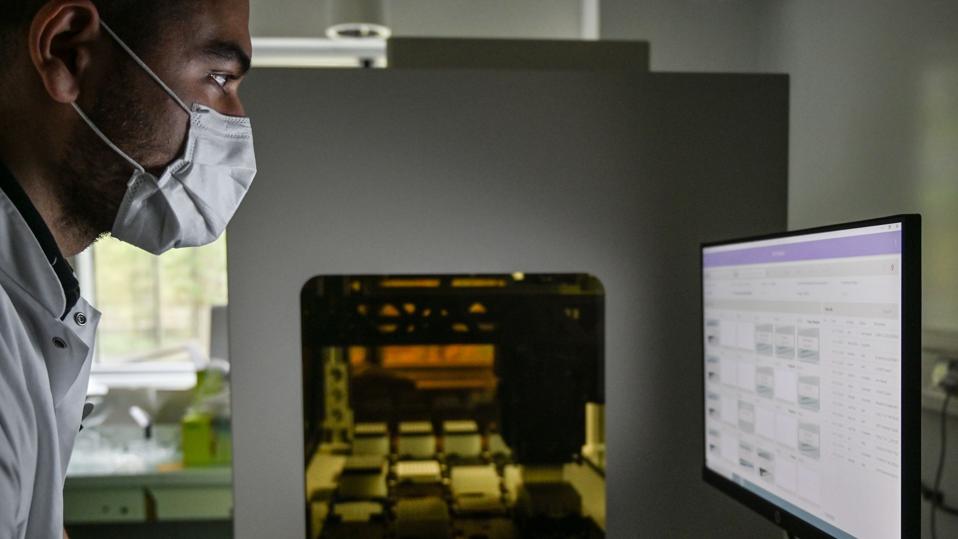Some Coronavirus Patients Test Positive For Weeks. Interpret Those Results With Caution
by Matthew BinnickerDr. Matthew Binnicker, an expert in the diagnosis of infectious disease, explains why someone might still test positive for Covid-19 weeks after they’ve recovered.

To date, the majority of patients with Covid-19 have been diagnosed using a laboratory test called PCR, which detects the virus’ genetic material (i.e., RNA) in clinical samples (e.g., nasal swabs). PCR is a very sensitive laboratory method – meaning it can detect minute amounts of viral RNA – and has been used for nearly 2 decades to diagnose a variety of infectious diseases, including influenza and strep throat. Despite being a rapid and inherently sensitive test, PCR has certain limitations that need to be carefully considered when interpreting the results.
One of those key limitations of PCR is its inability to determine whether a patient is infectious, or not. This is because the test is designed to detect the virus’ RNA, which is generally present when a virus is causing an active infection. However, RNA can also be present, and therefore, detected by PCR after a virus has broken down (i.e., become non-infectious) and released its genome into host cells or body fluids. From prior experience with other infectious diseases, we know that PCR tests can be positive for days or weeks after a patient has recovered from the illness and is no longer infectious.
As more testing is being performed for Covid-19, we are learning that some patients can test positive for weeks following their initial diagnosis. A recent study showed that 16% of patients with Covid-19 continued to test positive for SARS-CoV-2 RNA up to 24 days after resolution of symptoms and discharge from the hospital. In addition, some Covid-19 patients who recover from their illness and test negative by PCR may again test positive (i.e., go from PCR positive to negative to positive). So does this mean they never fully recovered? Are they still infectious? Or did they become reinfected with a new strain of the virus?
Here are some things to understand.

Even though they inform isolation and return-to-work decisions, PCR tests don’t measure if someone is contagious
When an individual tests positive for Covid-19, it is a common policy to require that they remain in isolation for a period of 10-14 days. In fact, the Centers for Disease Control and Prevention (CDC) recommends that those who test positive for Covid-19 remain in isolation until they have received two negative PCR results on samples collected at least 24 hours apart.
This is a conservative approach, but has been justified during the early stages of the Covid-19 pandemic due to the lack of data on the period of infectiousness of SARS-CoV-2, as well as the significant repercussions of allowing an infected individual to return-to-work or interact with others before there is confidence they are no longer infectious. However, PCR is not typically used as a ‘test of cure’ for other infectious diseases, since it can remain positive after a patient has cleared an infection.
What does it mean when a patient tests positive after recovering from Covid-19?
While studies are being performed to definitively answer this question, new data are emerging that suggest the period of SARS-CoV-2 infectiousness may not correlate with PCR positivity. In other words, an individual may not be able to infect others for as long as they test positive by PCR. To determine this, researchers have investigated two important questions. First, can the virus be cultured, or grown, from samples that are collected weeks after resolution of a patient’s symptoms but test positive by PCR? And second, do close contacts (e.g., family members, coworkers) of patients with persistently positive PCR tests become sick with Covid-19?
Last week, the South Korean CDC published important data aimed at addressing these questions. The study followed approximately 800 contacts of Covid-19 patients after they had recovered from their illness, tested negative, but once again tested positive by PCR. The researchers found no evidence that the contacts became ill with Covid-19. In addition, the South Korean scientists were unable to grow the virus from samples that were PCR positive at the latest time point.
Although these results suggest that Covid-19 patients may not be infectious for weeks or months following resolution of their symptoms, the exact timeframe over which an individual can transmit the virus to others remains unclear. Additional studies are needed to better define the period of viral infectivity, so that we can prevent the spread of Covid-19 but allow recovered patients the opportunity to emerge from isolation as soon as it is safe to do so.